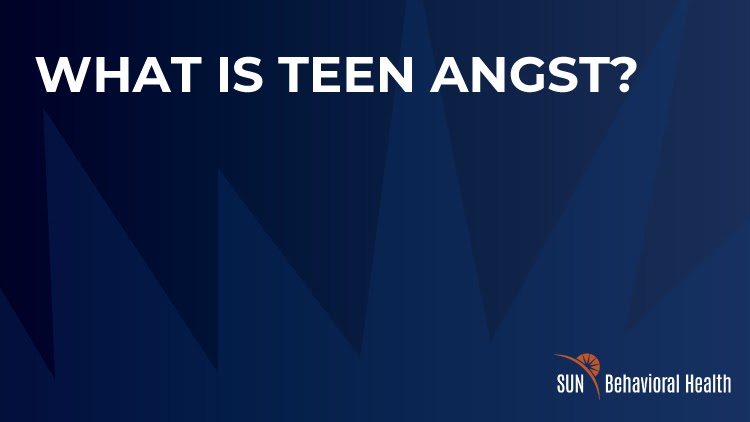Services
- Home
- Mental Health
- Who We Treat
- How We Treat
- Patients & Visitors
- About
- Lexington
close

Where have our loving, adorable, doe-eyed babies gone? Suddenly they’re walking around in hoodies and hiding their faces. They’re walking around slouched over and constantly listening to loud, often depressing music.
Anytime we want a response? A grunt or slight nod is all we get.
What is happening? Is there something wrong? Are they just being teenagers?
There are subtle things to look for in finding the true answer to if our teens are truly depressed or if they’re simply expressing what many of us know as teen angst.
Over the past few decades, our awareness of mental health and depression has grown tremendously, but there is still room for growth. Not many know that 13% of American teenagers will face at least one depressive episode before they turn 18.
Unfortunately, only 78% of children and teenagers that face depression receive treatment, according to the Centers for Disease Control and Prevention.
It is completely within reason to be here with concern for your kid when you notice them separating a bit. Hopefully, we can find some answers for you today.
Unlike depression, a mental health disorder, teen angst is not a medical term. Angst is simply a word that means worry or dread.
Teen angst is brought on by feelings of anxiety and insecurity, and it is entirely common for those ages 12-18. Given the hormonal, physical, and emotional changes that teenagers go through, angst is so very common.
The role of hormones in the turmoil of teen years cannot be overstated. These hormones often cause teens to feel emotions in a much more intense way. Small issues or inconveniences can feel like the end of the world when experienced under the microscope of teenage hormones.
Pair this influx of hormones with increases in social and school responsibilities and it is easy to understand why a teenager would become angsty and even begin to act out. During this time, teens are asked to accept more and more responsibilities every day as they transition toward early adulthood. High school is full of intense social situations and peer pressure on a daily basis, and many times, the pressure of these situations can play a big part in causing a teen to act out.
Angst is notably common in certain situations that trigger it, like when your teen is in the presence of a friend they have a complicated relationship with, in a public space like a sporting event, or during the build-up for an exam in school.
As a parent, it can be tough to try to determine whether the things your teen is going through are a normal part of the adolescent experience or if they may be experiencing a mental health disorder. Unlike teen angst, depression is a clinical diagnosis that can have lifelong effects on a person’s mental wellbeing.
In fact, research from the National Institutes of Health reports that 50% of lifelong mental illnesses start to show themselves by age 14. In a cruel twist of fate, this is also the age where a large number of teens are being pulled in many different directions by their hormones. Because of these factors, it can be very difficult to determine if your teen is experiencing actual disordered behaviors.

Mental health professionals often focus on three key areas of concern to determine whether or not a teen is suffering from a mental health disorder. These three factors include:
Severity of Issues
How severe the potential symptoms of depression or mental health disorders are can play a big role in telling the difference between normal teen angst and something more serious. Everybody deals with negative emotions on a regular basis; it is part of the human experience. This is especially true for teenagers that are dealing with new experiences and increased responsibilities every day.
When these negative emotions start to affect your teen’s ability to conduct themselves in everyday life, they may be cause for concern. Gauging the severity and intensity of your teen’s mental health hardships can help you determine whether your teen is experiencing a passing condition or a possible mental health disorder.
Duration of Symptoms
Does your teen experience issues with moodiness on a regular or consistent basis? Or is it simply every once in a while? If your teen goes through rough patches but is otherwise a fairly happy person, their troubles may simply be a case of typical teen angst.
If your teen is experiencing consistent and chronic difficulties with mood or depression, this may be a sign that they are developing a mental health disorder that must be addressed. Also, when your teen does experience moodiness and difficulties, do those pass quickly or remain an issue that makes it difficult for them to proceed in everyday life? Figuring out the answers to these questions can make it easier to determine if it’s time to seek professional help for your child.
Situations or Domains
When faced with a parent, teacher, or another authority figure, a teen may show more signs of angst. Think about when you were a teen. Did you tend to have a rebellious attitude or act out? It is a common occurrence for many teens to act in rebellion against authority figures, but this is not necessarily a sign that they are suffering from a mental health disorder.
If your teenager experiences issues with moodiness or depression even in their leisure time, such as when they’re hanging out with friends or in other low-pressure situations, this may be a sign they’re developing a mental health condition that must be addressed.
Watching our children suffer is tough. When your child’s behavior doesn’t qualify as a mental health disorder, there are still times when the pressure of being a teenager in the age of social media can be too much to bear. Even when they make it painfully clear that they want to be left alone, there are always ways you can support your child.
1. Give Them an Appropriate Amount of Space
It can be incredibly difficult to watch your teenager struggle with negative feelings. By giving them a healthy amount of space, you’re encouraging their problem-solving skills and helping them get one step closer to the independence of adulthood. So when your teen doesn’t want to talk about what’s bothering them, sometimes it’s best not to push the issue.
A big component of giving your teen “healthy” space is making sure they know they can talk to you whenever about anything. Forming a healthy relationship with your teen involves forming trust and allowing open communication with them.
2. Asking Your Teen How You Can Help
Sometimes, our teenagers are smarter and more insightful than we give them credit for. There are even times when they’re aware of exactly how you can help them. In a large number of cases, simply being someone who is there to listen to their problems can be all the help they need.
One of the biggest advantages that parents have is experience. Experience can’t be taught, it has to be, well, experienced. That doesn’t mean useful knowledge can’t be given using our experiences.
Every parent was once a teen and experienced all (or many) of the ups and downs that come along with the adolescent stage of life. Even if you pull from experiences where you made the wrong decision, that knowledge could be potentially useful to your teen. In fact, sharing stories where you didn’t make the best decision could bring you closer with your teen and work toward building a trusting relationship.

3. Provide Healthy Encouragement
Any relationship requires some maintenance and upkeep to remain strong, and your relationship with your child is no different. Any parent knows that positive reinforcement and encouragement in early childhood can help your child gain habits that will help them succeed throughout their life. This positive reinforcement may be just as important to a child in their adolescent years as well.
Teenagers may feel many negative emotions on a daily basis. Their body and brain are rapidly changing, which can lead to many insecurities about their looks, friendships, and even their relationships with other family members. Take a few minutes out of your day to remind your child how important they are and how much they mean to you. You’d be surprised how such a simple act could work wonders for your teen’s confidence and overall mood.
4. Encourage Them to Keep a Journal
Journaling doesn’t necessarily mean sitting and writing “Dear Diary” as they did in a mid-century family sitcom. Journaling could simply mean encouraging your teen to start logging and expressing how they’re feeling on any given day. Giving your teen a private safe space to express themselves can go a long way toward helping them gain insight into what makes them tick.
5. Reality Is Key
As our kids transition from children to teenagers, they start to realize how the world works. This can often lead to negative feelings toward the nature of life. Coming to terms with the fact that they may never make it to Mars or become president of the world can be a harsh realization at first, but sugar-coating the realities of the world doesn’t do your teen any good as they transition into adulthood.
Our job as parents isn’t necessarily to completely shield our teens from the ugliness of the world but rather to show them that the beauty of the world is worth dealing with the ugliness. As we established above, our teens are often smarter than we give them credit for. They’re no longer naive to some of the ways of the world and can often see through our attempts to protect them. The last thing we want to do as parents is alienate our children by lying to them about the realities of the world.
Helping a teen that is struggling with psychiatric issues, substance use, or other behavioral health problems can be the most heart-wrenching and confusing time a parent will ever face. But there is hope. At SUN, our experienced and encouraging team will identify your child’s needs and provide effective treatment options to set your family on a path to healing.
SUN Kentucky’s Inpatient Program for Teens
In some situations, especially when your teen is a danger to themselves or others, they may benefit from the comprehensive support and structure of inpatient care. During this period, they will receive the attention and treatment necessary to get back on a path of wellness. Some components of this program include:
SUN’s Intensive Outpatient Program (IOP) for Teens
For a teen who may be stepping down from hospitalization but still requires an elevated level of support and structure, the intensive outpatient program (IOP) at SUN may be the perfect solution. Teens in our IOP meet three times a week and work toward addressing and solving any unmet mental health needs they may be feeling.
Treatment Methods at SUN Kentucky
Treatment involves resolving the symptoms that may have led to hospitalization in the first place, crisis planning, and engaging the family in the appropriate continuing-care needs. Communication and treatments are geared toward the developmental stage of your teen. We use a safety system to teach the children to develop an internal sense of safety and control. SUN’s comprehensive treatment features include:
Here at SUN Kentucky, our adolescent treatment programs are designed for young people who need treatment for mental, emotional, or substance use problems. SUN’s team of experts is available 24 hours a day, seven days a week, partnering with teens and their families to help them map their journey to improved health and happiness.
As a parent, watching your child suffer from mental health hardship can be an incredibly difficult experience. When it comes to tackling these sensitive issues, you’re not alone.
At SUN, our master’s level clinicians are equipped with the skills necessary to guide your child toward good mental health and clarity. If your child is struggling, we can help. Please call us today at (859) 429-5188.